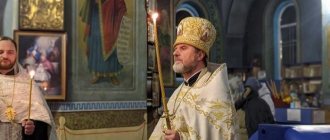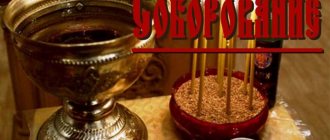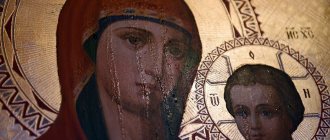About the Sacrament of Anointing (Unction)
Unction (or Blessing of Anointing) is a Sacrament in which, through sevenfold anointing with oil, consecrated by priestly prayer, God's help is given for the healing of mental and physical ailments. The Sacrament of Anointing is called Unction because several priests gather to perform it - a council.
According to the teaching of the Church, the source of disease lies in sin, and the first prediction of disease in the human race appeared after the fall of the first people. When a paralytic was brought to the Savior for healing from an illness, He directly draws attention to the source of the illness and says: “Son, your sins are forgiven you” (Mark 2:3-11).
In the same exact relationship, sin and bodily weakness are put in the Apostle James, who, having spoken about the healing of a sick person through anointing with oil and prayer, notes that at the same time the healed person’s sins are also forgiven (James 5:15). It cannot be argued that all illnesses, without exception, are a direct consequence of sin, but nevertheless, most illnesses are recognized in Christianity as a consequence of sin, and the prayers of the Sacrament of Anointing are permeated with this thought.
For the forgiveness of sins there is the Sacrament of Confession, but the moral causes of illness are not always visible to a person; on the contrary, many of them are hidden from the judgment of his conscience. The sick person, due to his weakness, cannot fulfill all the conditions of true repentance. During the Sacrament of the Blessing of Anointing, a whole council of His servants stands before the Lord for the exhausted sick person and, with the prayer of faith on behalf of the entire Church, begs God to grant the person, along with bodily health, remission of sins. For the sake of the prayers of the Church in the Sacrament of Anointing, the sick person is absolved of special sins, the resolution of which he could not receive in the Sacrament of Repentance: old sins, forgotten and unconfessed, subject, however, to a general repentant attitude; sins committed in ignorance; sins that were the cause of the disease, but which the patient did not know about; sins that the patient, due to his grave weakness, is not able to tell his confessor at the moment or cannot now atone for with good deeds. All these and similar sins are forgiven by the grace of God to the sick through the Sacrament of Anointing.
*Who can receive unction?
– Any baptized Orthodox Christian who has the blessing of a priest can take unction. Children under 7 years old are not given unction.
There is a misunderstanding of the essence of the Sacrament of Unction, which is expressed in the fact that it is allegedly required only by the dying and only for the remission of sins. This sacrament was established by the Holy Church according to the words of the holy Apostle James: “Is any of you sick, let him call the elders of the Church, and let them pray over him, anointing him with oil in the name of the Lord. And the prayer of faith will heal the sick person, and the Lord will raise him up; and if he has committed sins, they will be forgiven him” (James 5:14, 15). The prayers of the Rite of Anointing speak not of death, but of a return to life, but a renewed life, cleansed of sins.
* How to prepare for the Unction?
– We must receive the priest’s blessing for the Unction. Find out when it is held, come at a certain time, sign up at a candle shop, buy a candle. If possible, before the Unction it is advisable to confess what is recognized as a sin.
* Is it necessary to fast before the Unction?
– There is no special fast before the Unction. But since Unction in churches is usually performed during Lent , its observance is the duty of any Orthodox Christian.
* Is it necessary to confess before the Unction?
– If possible, it is advisable to confess before the Unction.
* When does Unction take place?
– During Lent, unction is performed several times. If necessary, it can be performed at any other time.
Usually Unction is performed at home at the bedside of the sick, but during Lent it takes place in churches.
* What to do after Unction?
– After Unction, it is necessary to partake of the Holy Mysteries of Christ.
* If after Unction you remember a sin, is it necessary to talk about it at Confession?
– Unction does not cancel or replace the Sacrament of Repentance. If after Unction you remember a sin, then you need to confess it.
* What to do with the oil left over from last year’s Unction?
– You can anoint yourself with the oil left after the Unction - apply it in a cross shape to sore spots, you can add it to food. If you use it with reverence and faith, then any use of the “cathedral” oil will serve as a blessing from God.
If the oil has spoiled, it can be burned.
* Is it possible to smear sick, unseemly places with holy oil??
- God created man and there is nothing bad in him, therefore it is allowed to smear any place when it is sick.
* Is it possible to unction infants??
– For infants under the age of seven, the Sacrament of Anointing is not performed on the basis of the words of the Apostle James: “let him call the elders... and if he has committed sins, they will be forgiven him” (James 5:14, 15), which presupposes in the sick person the power of faith, the presence spirit and consciousness of one's sins.
* Is it possible to administer unction to a patient when he is unconscious??
– Participation in all Sacraments must be conscious and voluntary. If the patient is unconscious, the Sacrament will consist of only one ritual in the absence of the person’s participation and mental ability to perceive grace. Grace is assimilated only if it is perceived by the human soul. This grace cannot be received by anyone whose understanding has ceased during the sacred rite, whose volition is absent, whose consciousness and self-awareness have frozen.
* What to do if the patient cannot be taken to the church for Unction?
– We need to invite a priest to the house.
A practical guide to parish counseling. St. Petersburg 2009.
How to prepare for unction?
Estimated reading time: 3 minutes.
We are in a period called Lent. Lent has its own characteristics, customs, and traditions. And in particular, there is one such rule: during Lent they resort to the sacrament of unction. There is such a widespread point of view about what it is, when it is necessary to do it and whether everyone needs it, or whether it is necessary to take unction only before death - this is what we are talking about today. Archpriest Igor Fomin , rector of the Church of the Holy Blessed Prince Alexander Nevsky at MGIMO, answers the questions
— Father Igor, I think we need to start with the simplest question. When is the unction held? In what cases does a person need it?
— A person gathers when he is sick, when he feels sick. But, of course, we are not talking about a runny nose. Every Christian gathers together once a year, for example, during Great Lent. Because unction is precisely the prayer in which we ask the Lord to forgive us our forgotten sins.
Photo by Vladimir Eshtokin
— How to prepare for unction?
— Classically it looks like this. First, a person confesses - (names) those sins that he remembers and has not yet confessed. Then the unction takes place. And then (at the next Liturgy) he receives the Holy Mysteries of Christ.
— That is, if I understand correctly, when we talk about unction, we mean that most of us are entitled to unction for “medical” spiritual reasons?
- Well, this is most likely not a medical indication, but a spiritual one. Those who encourage us to desire to be healthy not only physically, but also spiritually.
— In what cases does unction take place in the church? On what occasions are unctions held at home?
— Unction does not always take place in the church. This sacrament does not require any specific external circumstances, like, say, the sacrament of a wedding, which is always performed in a church, and only with rare exceptions can it be performed with the blessing of the ruling bishop at home. Unction is a sacrament that is performed at home, and there is no difference.
- Tell me, do children need to be unctioned? Infants under 7 years old?
— The sacrament of unction is performed for the reason that we ask God for forgiveness of sins we have forgotten. Therefore, infants - children under 7 years old - are not unified, since the Lord already forgives them their sins, if any. If the child has already reached the age of 8, then here, with the blessing of the family confessor, he can be unctioned. But usually unction is performed after 16-18 years.
Unction
What is Unction?
- Unction (or Blessing of Anointing) is a Sacrament in which, through anointing with consecrated oil (oil), God's help is given for the healing of mental and physical ailments. The Sacrament of Anointing is called Unction because, as a rule, several priests gather together to perform it - a council.
Why is it necessary to undergo unction?
— According to the teachings of the Church, the source of disease lies in sin, and the first prediction of disease in the human race appeared after the fall of the first people. When a paralytic was brought to the Savior for healing from an illness, He directly draws attention to the source of the illness and says: “Son, your sins are forgiven you” (Mark 2:3-11). In the same exact relationship, sin and bodily weakness are put in the Apostle James, who, having spoken about the healing of a sick person through anointing with oil and prayer, notes that at the same time the healed person’s sins are also forgiven (James 5:15). It cannot be argued that all illnesses, without exception, are a direct consequence of sin, but nevertheless, most illnesses are recognized in Christianity as a consequence of sin, and the prayers of the Sacrament of Anointing are permeated with this thought.
For the forgiveness of sins there is the Sacrament of Confession, but the moral causes of illness are not always visible to a person; on the contrary, many of them are hidden from the judgment of his conscience. The sick person, due to his weakness, cannot fulfill all the conditions of true repentance. During the Sacrament of the Blessing of Anointing, a whole council of His servants stands before the Lord for the exhausted sick person and, with the prayer of faith on behalf of the entire Church, begs God to grant the person, along with bodily health, remission of sins. We believe that for the sake of the prayers of the Church in the Sacrament of Anointing, the sick are absolved of sins for which he could not receive resolution in the Sacrament of Repentance: long-standing sins, forgotten and unconfessed, subject, however, to a general repentant attitude; sins committed in ignorance; sins that were the cause of the disease, but which the patient did not know about; sins that the patient, due to his grave weakness, is not able to tell his confessor at the moment or cannot now atone for with good deeds. All these and similar sins are forgiven by the grace of God to the sick person through the Sacrament of Anointing.
Can Unction speed up a person's death?
- Can not. But the life span of any person depends only on the will of the Heavenly Father, Who often sends bodily illness to admonish and change life. And the Lord can prolong the life of a dying person for the purpose of allowing him to adequately prepare for the transition to eternity.
Unfortunately, persistent prejudices are associated with the Sacrament of Anointing, which repel the faint-hearted from the very possibility of resorting to the saving action of God's grace. People prone to superstitions are afraid of Unction, believing that this is “the last Sacrament and it will hasten the death of themselves or the relatives who receive it. In no case should one believe such prejudices that those who have recovered after the Blessing of Anointing should never again eat meat; that one must fast, in addition to Wednesday and Friday, also on Monday; that he cannot have marital relations, should not go to the bathhouse, take medicine, etc. These fantasies undermine faith in the gracious power of the Sacrament and destroy the spiritual life of the person who accepts these fantasies. In addition, they introduce temptation into the minds of “outsiders”, those who do not belong to the Church, but who sympathize with it.
How to prepare for the Unction?
- You need to get the priest’s blessing for the Unction. Find out when it is held, come at a certain time, sign up at the candle shop, tell your name, buy a candle. If possible, before the Unction it is advisable to confess in advance what is recognized as a sin.
When does Unction take place?
— During Lent, unction is performed several times. If necessary, it can be performed at any other time.
Usually Unction is performed at home at the bedside of the sick, but during Lent it takes place in churches. In this case, the words of the Apostle James: “Is any of you sick” (James 5:14) are taken in a broad sense, that is, they mean not only those who are physically sick, but also those who suffer mentally, having sorrow, despondency, heaviness from sinful passions.
Is it necessary to fast before the Unction?
— There is no special fast before the Unction. But since Unction in churches is usually performed during Lent, its observance is the duty of any Orthodox Christian.
Who can take unction?
- Any baptized Orthodox Christian who has the blessing of a priest can take unction. Children under 7 years old, as a rule, are not given unction.
There is a misunderstanding of the essence of the Sacrament of Unction, which is expressed in the fact that it is allegedly required only by the dying and only for the remission of sins. This sacrament was established by the Holy Church according to the words of the holy Apostle James: “Is any of you sick, let him call the elders of the Church, and let them pray over him, anointing him with oil in the name of the Lord. And the prayer of faith will heal the sick person, and the Lord will raise him up; and if he has committed sins, they will be forgiven him” (James 5:14-15). The prayers of the Rite of Anointing speak not of death, but of a return to life, but a renewed life, cleansed of sins.
Is it possible to administer unction to a sick person when he is unconscious?
— Participation in all Sacraments must be conscious and voluntary.
If a sick person who is in an unconscious state has previously participated in church sacraments and expressed a conscious desire to receive unction at a time when he could give an account of his actions, then the possibility of performing the Sacrament of Anointing on him should be consulted with a priest.
Is it possible to unction infants?
— For infants under seven years of age, the Sacrament of Anointing is not performed on the basis of the words of the Apostle James: “let him call the elders... and if he has committed sins, they will be forgiven him” (James 5:14-15), which presupposes in the sick person the power of faith, the presence spirit and consciousness of one's sins.
What to do if the patient cannot be taken to the church for Unction?
- We need to invite a priest to the house.
If after Unction you remember a sin, is it necessary to talk about it at Confession?
— Unction does not cancel or replace the Sacrament of Repentance. If after Unction you remember a sin, then you need to confess it.
What to do with the oil left over from last year's Unction?
— You can anoint yourself with the oil left after the Unction - apply it crosswise to sore spots, you can add it to food. If you use it with reverence and faith, then any use of the “cathedral” oil will serve as a blessing from God.
Is it possible to smear sick, unseemly places with holy oil?
- God created man and there is nothing bad in him, therefore it is allowed to smear any place when it hurts. But usually, the following parts of the body are anointed with holy oil with prayer in a cross shape: forehead, cheeks, chest, palms and hands, legs.
What to do after Unction?
— After Unction, it is necessary to partake of the Holy Mysteries of Christ.
Is it possible to unction infants?
— For infants under the age of seven, the Sacrament of Anointing is not performed on the basis of the words of the Apostle James: “let him call the elders... and if he has committed sins, they will be forgiven him” (James 5:14,15), which presupposes in the sick person the power of faith, the presence spirit and consciousness of one's sins.
Is it possible to administer unction to a sick person when he is unconscious?
~ Participation in all Sacraments must be conscious and voluntary. In the unconscious state of the patient, the Sacrament will consist of only one ritual in the absence of participation and the mental ability of the person to perceive grace. Grace is assimilated only if it is perceived by the human soul. This grace cannot be received by anyone whose understanding has ceased during the sacred rite, whose volition is absent, whose consciousness and self-awareness have frozen.
What to do if the patient cannot be taken to the church for Unction?
- We need to invite a priest to the house.
ABOUT NAME DAYS AND NAME NAMING
How to correctly determine who your saint is?
- You need to find the saint of the same name in the month, and if there are several of them, then choose the one whose memorial day comes first after his birthday.
How to determine the name day?
— Name day is the day of remembrance of the saint of the same name, closest to his birthday.
Name day and Angel's day - are they the same thing?
- No. The Guardian Angel is given by God to every person at Baptism; he has no name. And the saints in whose honor people are given names are their patrons. The day of remembrance of the saint whose name a person bears is a name day.
Angel Day is the day of a person’s Baptism, and Angel Day can also be called the day of remembrance of all the ethereal Heavenly Powers (November 21, new style).
Each person has his own Guardian Angel, and the same saint can be the patron saint of many people with the same names.
How should you spend your name day?
- On this day you need to go to Church, take communion, submit notes about the health and repose of your relatives, order a prayer service to your patron saint.
The best activity on name day is considered to be reading the life of one’s saint and other spiritual books, as well as performing deeds of piety.
How to choose a name for a baby?
— The baby is usually named after the saint, whose memory is celebrated by the Church on the eighth day after his birth, on the birthday itself or on the day of Epiphany. But you can choose the name of any saint whose memory is celebrated shortly after the baby’s birthday.
Unction. 10 questions about Unction
Unction. 10 questions about Unction
During Lent, in almost all churches, according to tradition, unction is performed, or in another way it is also called the Sacrament of Anointing.
Many brochures and articles have already been written about the Sacrament itself, about its meaning and significance. I would like to talk about the practical side of the Sacrament. In what cases is it necessary to take unction and how often?
There are different opinions. Even in our Theological Seminary, teachers spoke differently on this matter. Some said that the Sacrament of Anointing should only be performed on the sick and that there is no point in unction for healthy people. Others said that there are no absolutely healthy people and everyone needs to undergo unction, but not more than once a year, for example, during Great Lent. The fact is that it is best to discuss such issues personally with your confessor.










